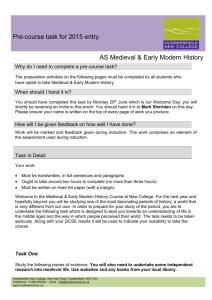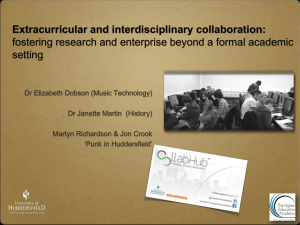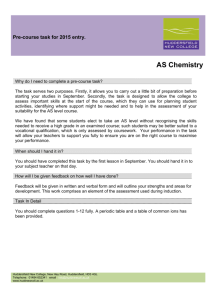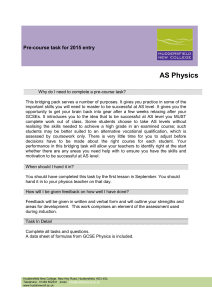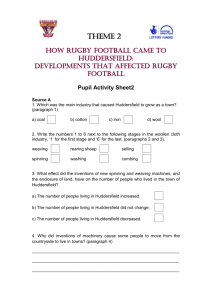Psychology - Huddersfield New College
advertisement
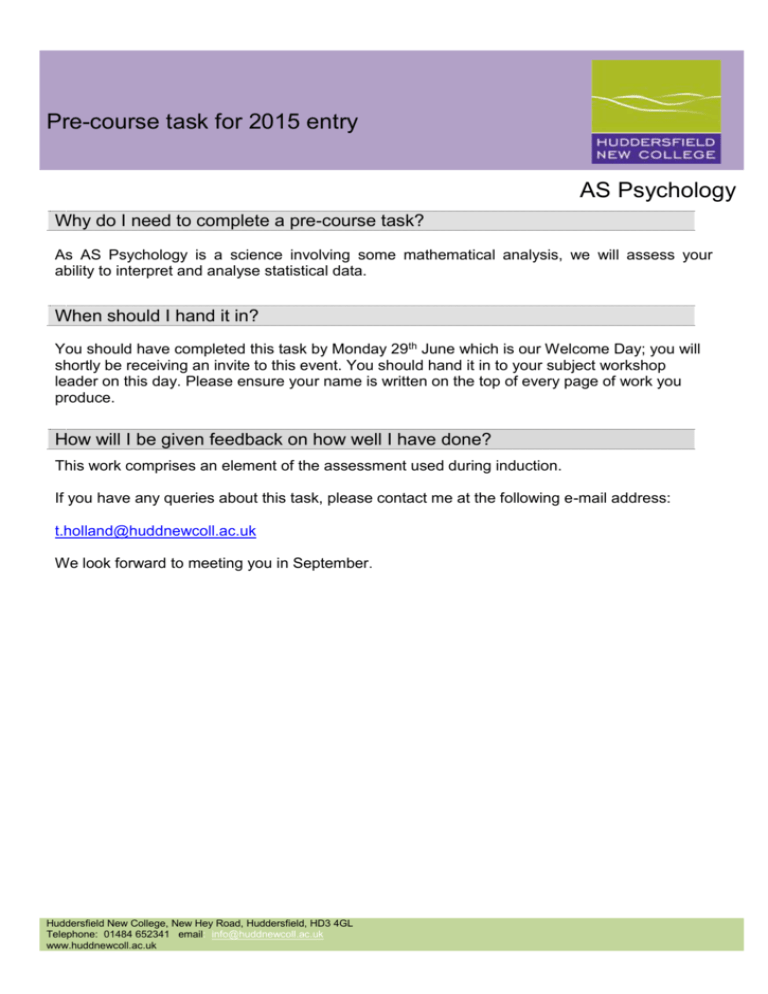
Pre-course task for 2015 entry AS Psychology Why do I need to complete a pre-course task? As AS Psychology is a science involving some mathematical analysis, we will assess your ability to interpret and analyse statistical data. When should I hand it in? You should have completed this task by Monday 29th June which is our Welcome Day; you will shortly be receiving an invite to this event. You should hand it in to your subject workshop leader on this day. Please ensure your name is written on the top of every page of work you produce. How will I be given feedback on how well I have done? This work comprises an element of the assessment used during induction. If you have any queries about this task, please contact me at the following e-mail address: t.holland@huddnewcoll.ac.uk We look forward to meeting you in September. Huddersfield New College, New Hey Road, Huddersfield, HD3 4GL Telephone: 01484 652341 email: info@huddnewcoll.ac.uk www.huddnewcoll.ac.uk The task Interpretation and analysis of statistical data. Please ensure your answers are handwritten as much as possible. Your Name : 1 Look at the table below which contains some examples of ways to analyse data. Description Calculated by looking at the middle score in a set of data after the data has been put into ascending order Calculated by finding the most frequently occurring score Calculated by adding up all of the scores and dividing the total by the number of participants Term From the following list of terms, choose the one that matches each description and write A, B, C or D in the box next to the correct description. A Mean B Mode C Median D Range (3 marks) 2 A psychology teacher had an idea that students who study drama are more extravert than students who do not study drama. She wanted to find out whether or not this is true and decided to conduct an experiment. This is what she did. ● She asked all 30 members of her Year 11 psychology class whether or not they studied drama. She discovered that half of her class did study drama. ● After obtaining their consent to take part in the experiment, she asked every member of her class to complete the EPI (a personality test). The test measures extraversion. The higher the score, the more extravert a person is. ● She calculated the mean extraversion score for the students who studied drama and the mean extraversion score for the students who did not study drama. 2 (a) Write a suitable hypothesis for this study. ...................................................................................................................................................................... ...................................................................................................................................................................... ...................................................................................................................................................................... ......................................................................................................................................... (2 marks) Huddersfield New College, New Hey Road, Huddersfield, HD3 4GL Telephone: 01484 652341 email: info@huddnewcoll.ac.uk www.huddnewcoll.ac.uk The results of the study are shown in Table 1. Table 1: The mean extraversion scores out of 50 for students who studied drama and for students who did not study drama Students who studied drama Mean extraversion score 40 Students who did not study drama 20 2 (b) Use the graph paper below to display the mean extraversion scores shown in Table 1. Provide a suitable title and fully label your graph. Title: ................................................................................................................................... (5 marks) Huddersfield New College, New Hey Road, Huddersfield, HD3 4GL Telephone: 01484 652341 email: info@huddnewcoll.ac.uk www.huddnewcoll.ac.uk 2 (c) (i) Do the results of the investigation provide support for what the psychology teacher was trying to find out? (Tick the correct box.) Yes No (1 mark) 2 (c) (ii) Explain the reason for your answer to 2 (c) (i). Refer to the aim and results of the study in your explanation. .................................................................................................................................. ................................................................................................................................... ................................................................................................................................... ................................................................................................................................... ................................................................................................................................... ................................................................................................................................... (3 marks) 3 (a) Tick the correct column for each statement. Statement Never True Sometimes True Always True An impossible event has a probability of –1 An event which is unlikely has a probability of 0.75 An event which is certain has a probability of 1 (3 marks) 3 (b) Put these probabilities in order starting with the lowest. 0.3 1/3 Lowest 33% ………………… ………………… Highest ………………… (2 marks) Huddersfield New College, New Hey Road, Huddersfield, HD3 4GL Telephone: 01484 652341 email: info@huddnewcoll.ac.uk www.huddnewcoll.ac.uk 4 A bag only contains red and blue counters. It contains 24 red counters. A counter is chosen at random from the bag. The probability of choosing a blue counter is 1/4. How many counters are in the bag? Show your workings. ...................................................................................................................................................................... ...................................................................................................................................................................... ...................................................................................................................................................................... ......................................................................................................................................... Answer ...................................................................... (3 marks) 5 Studying Psychology involves analysing research and drawing conclusions from data. You need to go onto the internet to find out about a particular Psychology experiment. The research you need to find is the Loftus and Palmer (1974) study on leading questions and eyewitness testimony. You will be able to find a description of this study on the internet. a) Outline what happened in the research and what they found. ………………………………………………………………………………………………………………………… ………………………………………………………………………………………………………………………… ………………………………………………………………………………………………………………………… ………………………………………………………………………………………………………………………. ………………………………………………………………………………………………………………………… ………………………………………………………………………………………………………………………… ………………………………………………………………………………………………………………………… ………………………………………………………………………………………………………………………. ………………………………………………………………………………………………………………………… ………………………………………………………………………………………………………………………… ………………………………………………………………………………………………………………………… ………………………………………………………………………………………………………………………. ………………………………………………………………………………………………………………………… ………………………………………………………………………………………………………………………… ………………………………………………………………………………………………………………………… ………………………………………………………………………………………………………………………. ………………………………………………………………………………………………………………………… ………………………………………………………………………………………………………………………… ………………………………………………………………………………………………………………………… ………………………………………………………………………………………………………………………. ………………………………………………………………………………………………………………………… ………………………………………………………………………………………………………………………… ………………………………………………………………………………………………………………………… ………………………………………………………………………………………………………………………. ………………………………………………………………………………………………………………………… ………………………………………………………………………………………………………………………… ………………………………………………………………………………………………………………………… ………………………………………………………………………………………………………………………. ………………………………………………………………………………………………………………………… ………………………………………………………………………………………………………………………… ………………………………………………………………………………………………………………………… ………………………………………………………………………………………………………………………. ………………………………………………………………………………………………………………………… ……………………………………………………………………………………………………………………… Huddersfield New College, New Hey Road, Huddersfield, HD3 4GL Telephone: 01484 652341 email: info@huddnewcoll.ac.uk www.huddnewcoll.ac.uk b) What do you think they were trying to find out by doing this research? c) Why do you think they conducted this experiment in a laboratory? d) What do you think are the problems with studying people’s behaviour in a set-up situation like a laboratory? e) Ecological validity means that a study is representative of real life. Do you think this study has ecological validity and why/why not? f) Demand characteristics occur when research participants are aware that they are taking part in a study, and change their behaviour. Do you think this study would have suffered from demand characteristics? Why/why not? g) Sample bias: look at the sample of participants involved in this study. Who were they, and where were they from? Might this have affected the results? Glossary of terms. Eyewitness testimony - how accurate we are at remembering events we have just seen. Laboratory experiment - where a situation is set up under controlled conditions to see how people behave in certain situations. Leading questions – when a question seems to suggest what the correct answer might be. Huddersfield New College, New Hey Road, Huddersfield, HD3 4GL Telephone: 01484 652341 email: info@huddnewcoll.ac.uk www.huddnewcoll.ac.uk 6 A Psychology student had an idea for a memory experiment. He thought that people who were born in England would remember the names of English towns and cities better than the names of French towns and cities. He wanted to see whether or not this was true. This is what he did. ● He selected the names of 10 English towns and cities; for example, Bristol, Leeds, Bradford, Hull. ● He selected the names of 10 French towns and cities; for example, Paris, Nice, Orleans, Lille. ● He then put the 20 names into one list using a process of randomisation. 6 (a) Describe how the student could randomise the list of 20 names. ................................................................................................................................... ................................................................................................................................... ................................................................................................................................... ................................................................................................................................... ................................................................................................................................... ................................................................................................................................... (3 marks) The student decided that his target population would be all Year 11 students who were born in England. He selected his sample by going into his school canteen and asking Year 11 students whether or not they were born in England. He chose the first 10 students who said “Yes” as his sample. 6 (b) (i) What sampling method did the student use? (Tick the correct box.) Random Opportunity Systematic Stratified (1 mark) 6 (b) (ii) Identify one advantage and one limitation of the sampling method you selected in 5 (b) (i). Advantage ................................................................................................................................... ................................................................................................................................... Limitation .................................................................................................................................. ................................................................................................................................... (2 marks) The student then conducted his experiment using standardised procedures. This is what he did. ● He took participants individually to a quiet area. ● He gave participants one minute to study the list of 20 towns and cities. ● He removed the list. ● He gave participants one minute to write the names of as many towns and cities that they could recall from the list. ● He then counted the number of English towns and cities, and the number of French towns and cities that each participant recalled. 6 (c) Write a suitable hypothesis for this experiment. ................................................................................................................................... ................................................................................................................................... (2 marks) Huddersfield New College, New Hey Road, Huddersfield, HD3 4GL Telephone: 01484 652341 email: info@huddnewcoll.ac.uk www.huddnewcoll.ac.uk 6 (d) Identify the experimental design used in this experiment. (Tick the correct box.) Independent groups Matched pairs Repeated measures (1 mark) 6 (e) (i) Identify the independent variable in this experiment. (Tick the correct box.) Whether or not the participants were born in England Whether the towns and cities were English or French (1 mark) 6 (e) (ii) Identify the dependent variable in this experiment. ................................................................................................................................... ................................................................................................................................... (1 mark) 6 (f) Explain why it was important for the student to use standardised procedures with each participant in this experiment. ................................................................................................................................... ................................................................................................................................... ................................................................................................................................... ................................................................................................................................... ................................................................................................................................... ................................................................................................................................... (3 marks) 6 (g) The results of the experiment are shown in Table 1. Table 1: The number of English towns and cities and the number of French towns and cities recalled by each participant. Participant Number of English Number of French towns and cities towns and cities 1 7 7 2 6 5 3 7 6 4 7 6 5 8 8 6 6 4 7 8 7 8 1 9 9 9 8 10 8 7 6 (g) (i) Identify the participant with anomalous scores. Participant number…………………… Huddersfield New College, New Hey Road, Huddersfield, HD3 4GL Telephone: 01484 652341 email: info@huddnewcoll.ac.uk www.huddnewcoll.ac.uk (1 mark) 6 (g) (ii) Calculate the total number of English towns and cities and the total number of French towns and cities recalled in this experiment. English: ................ French: ................. (2 marks) 6 (g) (iii) Explain how the anomalous scores have affected the totals that you have calculated in your answer to 6 (g) (ii). ................................................................................................................................... ................................................................................................................................... ................................................................................................................................... ................................................................................................................................... ................................................................................................................................... ................................................................................................................................... (3 marks) Huddersfield New College, New Hey Road, Huddersfield, HD3 4GL Telephone: 01484 652341 email: info@huddnewcoll.ac.uk www.huddnewcoll.ac.uk

